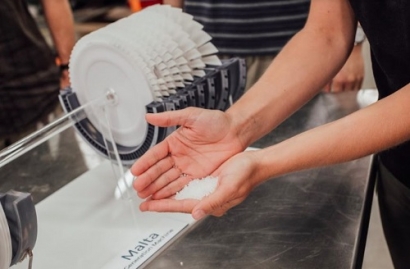
Malta Inc., which started as "Project Malta" at the Moonshot Factory, but is now an independent company, announced Wednesday that it has raised $26 million in a round of funding led by Breakthrough Energy Ventures with participation from other investors including Concord New Energy Group, a wind and solar power developer, and Alfa Laval, a Swedish industrial company.
Bloomberg, of Bloomberg News fame, and Bezos, the founder of Amazon, are among Breakthrough Energy Ventures investors.
Microsoft founder Gates is the chairman of the fund, which also counts Masayoshi Son, the Japanese business magnate, and Ray Dalio, founder of Bridgewater Associates, one of the world's largest hedge funds, as investors.
In a statement, Ramya Swaminathan, CEO of Malta Inc., said "Our investors share our vision to create a scalable storage solution that will facilitate further expansion of renewable energy while improving grid stability and resilience across the globe.
"Beyond capital investment, they are truly partnering with us to build a first-of-a-kind product. We appreciate their confidence in our strategy and in our team's ability to execute on it," Swaminathan said.
The infusion of funds will allow Malta to further develop a system that uses large containers of molten salt and cooler liquid to store electricity generated from variable sources such as solar and wind.
The system is based on well-established principles in thermodynamics for a system that stores electricity as heat in high temperature molten salt and cold in a low temperature antifreeze liquid.
While incubated at Alphabet's Moonshot Factory, the project underwent a rigorous evaluation and de-risking process.
Swaminathan, who previously ran Rye Development, a Boston-based developer of renewable energy projects, said Malta will now work with industry partners to turn the detailed designs developed and refined at X into industrial-grade machinery for its first pilot system.
As currently designed, Malta's system can store electricity for days or even weeks, until it's needed. The electricity can come from any source (i.e. wind, sun, or fossil fuels) in any location.
According to the company's officers, Malta has the potential to make existing capital investments in both fossil and renewable generation more productive while dramatically improving power grid stability and resilience.
"A lack of affordable, reliable grid-scale energy storage is currently limiting the shift to renewable energy," said Raj Apte, PhD, Science Adviser at the Moonshot Factory.
"Malta's technology gives us a shot at storing all the renewable energy we create cheaply and reliably. With X having done our part to bring Malta's technology as far as we can take it, we're excited to hand the baton to the Malta team for the next phase of product development and deployment," Apte said.
"Solving the intermittency problem of renewable energy is a critical part of delivering inexpensive and reliable clean energy," said Carmichael Roberts of Breakthrough Energy Ventures.
"Malta's energy storage system is a different and promising approach from conventional batteries, using existing components and inexpensive resources to store energy as heat – and that makes the system cost-effective to scale. We're also excited about this investor syndicate, pooling our unique resources to bring this technology to market," Roberts said.
In a blog post, Alphabet explained "at X we support our projects through the early stage prototyping and de-risking of their ideas, and then we help them find whatever business path or structure works best for the type of problem they’re working on.
"In Malta’s case, we’re looking forward to cheering them on as an independent company focused on developing an affordable and reliable way to store renewable energy — something that requires partners with very specialized skills and expertise," the post said.
Malta is the latest X Moonshot project to graduate as a freestanding company independent of Alphabet.
In May, Dandelion, another X Moonshot factory project, launched Dandelion Air, a home geothermal heating and air conditioning system the company said is four times more efficient than any furnace on the market and nearly twice as efficient as a conventional air conditioning system.
Dandelion Air’s efficiency comes from tapping into the ground as a heat source or sink. Individual systems cost about $20,000, about half the price of traditional geothermal installations in the United States.
Alphabet says it is continuing to look for new ways technology can be used to help reduce carbon emissions, and it remains committed to a number of projects in this area, including Makani, the airborne wind energy developer.
Photo: Salt has the potential to transform how we store energy. (Photo courtesy of Malta Inc.)

